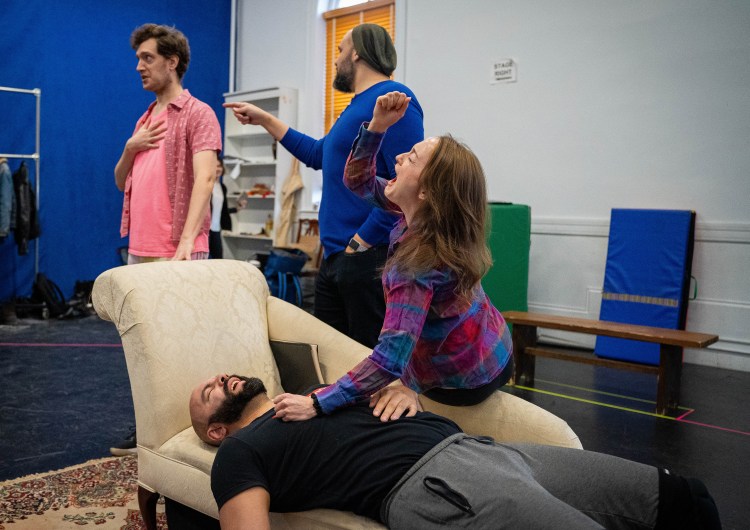Written in 2012 by Henry Lewis, Henry Shields and Jonathan Sayer, who met at London Academy of Music and Dramatic Arts, “The Play That Goes Wrong” has become a West End and Broadway hit, with sequels, and a BBC TV series, “The Goes Wrong Show.”
Why is it such a thing? “Things in the world can be bad, and the play is hilarious and wonderful,” said director Kevin R. Free, who returns to Portland Stage to direct his fifth production. He has big help from movement coordinator Michael Trautman, who has nearly five decades of national experience performing and teaching movement, mask, and mime. They joined a conversation on a chilly morning before the day’s rehearsals began.
Kevin, is there a singular slapstick moment in the show that really gets you?
FREE: I spend a lot of rehearsal testing my bladder. The actors are so funny all the time. But yesterday they showed me some stuff they had worked on without me and my jaw dropped. It was Khalil LeSaldo, falling from an upper platform to the ground and it looks like he faceplants. Just, on the ground. It’s so wonderful. But then, in character, he limped offstage, which made it too real. We don’t want the audience worried.
TRAUTMAN: Pain over time equals comedy, but it’s also the relationship of the pain to time. Maybe you hit your thumb and it’s “ow, ow, ow, ow, ow, ow” for a minute and a half. But with Khalil’s fall, he hits the stage and comes back up and he’s okay. You take the time away from the pain rather than extend it.
Yes, Michael, tell us more about your role in this production.
Trautman: Actors are great communicators with voice and language. I help them physically step it up because slapstick is a type of stage combat, and while many have training, the movement needs to be thoughtful. How are they going to get to the floor without hurting themselves? In teaching, my goal is to increase someone’s vocabulary of movement. Gesture is the most universal language. You can travel the world and get by through gesture. As part of this show’s programming, on Saturday, February 3, we are doing an intensive for high schoolers to introduce slapstick techniques, and when they watch the play, they can see how it works.
When you think about opening night, what are you most excited about?
FREE: The thing that I’m almost always excited about—and I’m going to say for the first time here—is for the actors to not need us; to let them fly and take it over. Of all the shows that I’ve directed at Portland Stage, we’re most ahead of the game. They’re doing things that make me howl with laughter. They are just going to be so brilliant in this play.
TRAUTMAN: An opening for me is like the first time you ski on a double black diamond trail. You’re standing at the top of the mountain and the only way down is to ski down. When they say, “Curtain!”, there’s no stopping. And this play is packed with things that should stop them. It’s just so exciting.
FREE: Um, so this man just scared the crap out of me. Now I’m terrified. What the hell? We don’t have to do the show. [Laughter, all around.]
You have 10 more days!
FREE: You know what? When I left my apartment and started walking up that damn hill, I felt like I was at the top of a double black diamond ski slope! All I could think was, “I don’t want to do this. I’m too old for this.” But then I made it. And I’ve had a delightful time already.

Comments are not available on this story.
Send questions/comments to the editors.


